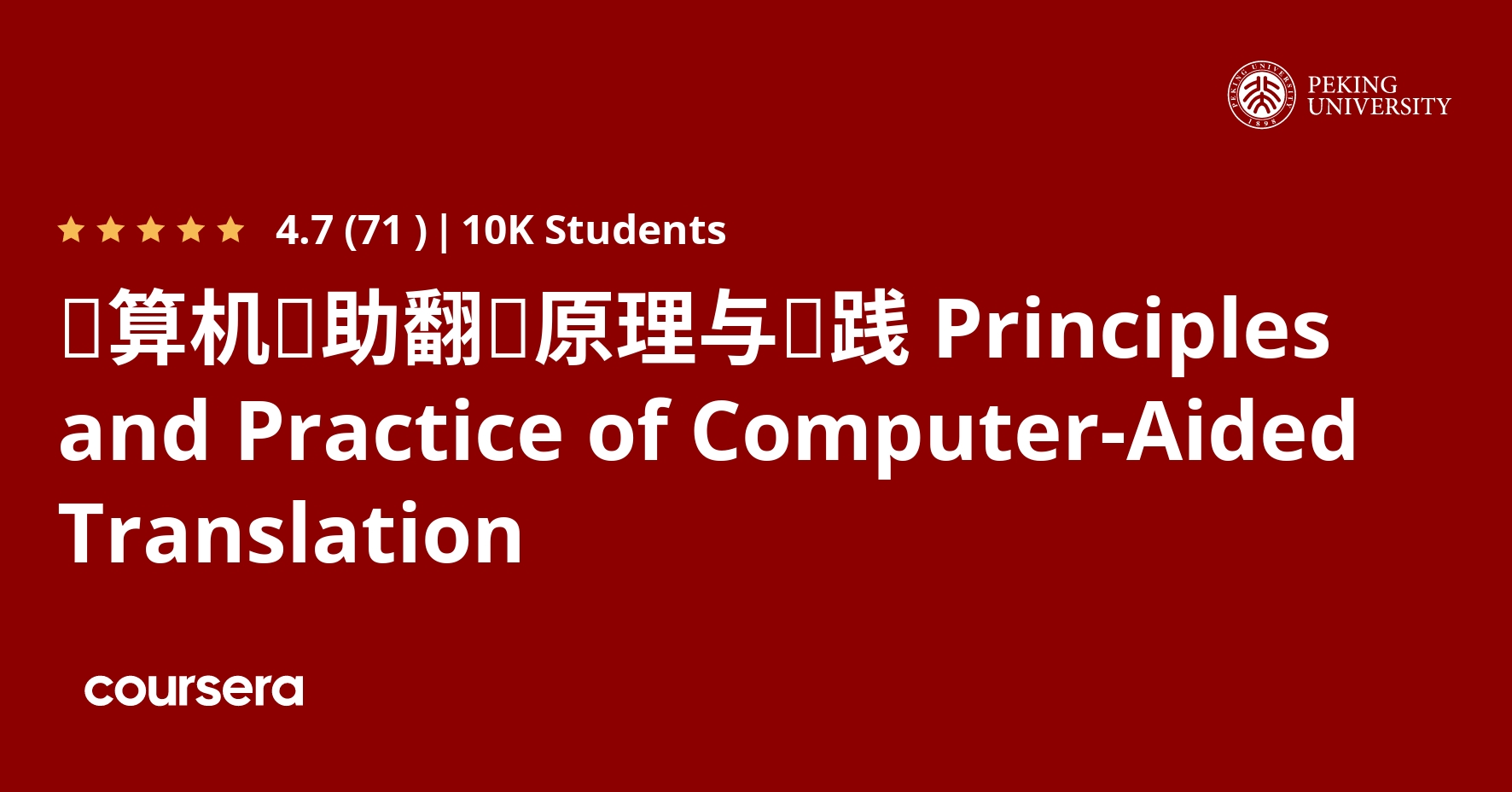Description
现代语言服务行业要求从业人员必须具有利用计算机及网络来使用各类技术辅助工具帮助其工作的能力,而不是仅仅学会几款狭义的计算机辅助翻译软件。
本课程主要讲授计算机辅助翻译技术的基础概念,学习多种计算机辅助翻译工具的使用方法,锻炼学生在技术环境下从事翻译工作等各类语言服务工作的能力,帮助学生理解信息化时代的语言服务工作。
课程完整涵盖现代语言服务的基本情况介绍、翻译技术基本概念、语言服务项目执行过程的信息环境与信息技术、如何利用电子辞典、网络资源及语料库工具辅助翻译工作、狭义和广义的计算机辅助翻译工具原理及实战演练、翻译内容质量评定、多人协同翻译项目、翻译管理等多方面的内容。作为翻译类专业学生的必修课程,本课程适合语言类专业学生学习。通过课程的学习,有助于学习者了解现代语言服务行业,增强各类计算机辅助翻译工具的使用技能,提高包括翻译工作在内的各类语言服务工作的效率。
该课程是“北大-德稻网络公开课程”中的一门,由北京大学与德稻教育联合提供。
本课程同时受到“语言能力协同创新计划”资助和支持。
Those who work in modern language service industry are required to be capable of using computers and Internet to aid their translation job by adapting a variety of efficient tools, rather than just using word processor tools and several basic computer-aided translation software.
This course teaches the basic concepts of computer-aided translation technology, helps students learn to use a variety of computer-aided translation tools, enhances their ability to engage in various kinds of language service in such a technical environment, and helps them understand what the modern language service industry looks like.
This course covers introduction to modern language services industry, basic principles and concepts of translation technology, information technology used in the process of language translation, how to use electronic dictionaries, Internet resources and corpus tools, practice of different computer-aided translation tools, translation quality assessment, basic concepts of machine translation, globalization, localization and so on. As a compulsory course for students majoring in Translation and Interpreting, this course is also suitable for students with or without language major background. By learning this course, students can better understand modern language service industry and their work efficiency will be improved for them to better deliver translation service.
The course is one of the PKU-DeTao MOOCs, which is a joint effort by Peking University and DeTao Masters Academy.
What you will learn
导言:课程学习指南 Lecture 0: Learning Guide [LG]
本单元我们将为您介绍课程的学习指南,帮助您了解课程的结构,有助于您制定自己的学习计划,达到更好的学习效果。This module introduces the guide of our course. You will know about the structure of this course and this may help make your own study plan.
第一周 新时代的语言服务 Lecture 1: Language Service of the New Age [LS]
通过本单元的学习,您将了解新时代的语言服务行业的现状,了解翻译流程、翻译技术、相关辅助翻译工具,也可以更好的理解信息技术与翻译的关系。In this module, you will learn more about language service of new ages, the translation process, translation technology and some computer-aided translation tools. You will better understand the relationship between information technology and translation.
第二周 互联网搜索引擎/信息服务与翻译实践 Lecture 2: Internet Service and Translation Practice [IS]
本单元,您将了解在翻译过程中使用到的互联网搜索引擎和学术数据库的相关知识,并且配有真实的翻译案例讲解,帮助大家更好的掌握以上知识。In this module, we’re going to introduce the Internet services that can be used during the translation process, including search engines and multiple academic databases. There are also two special topics, which can help you how to use internet service and databases in translation process.
第三周 语料库与翻译研究 Lecture 3: Introduction to Corpus-based Translation [IC]
在本单元中,我们将学习基于语料库的翻译研究,对语料库的背景、语料库的发展历史、语料库的使用方法及其分类、优缺点会有较为详细的介绍,同时配有翻译案例视频,为大家演示如何借助语料库来进行翻译关键词验证。In this module, we’re going to learn corpus-based translation. You will get better understanding of the background and history of corpus, its category, advantage and disadvantages, as well as how to use corpus in our translation process.




